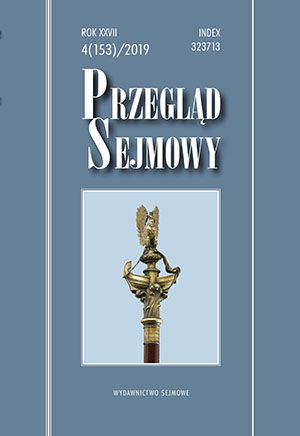Przystąpienie do rokowań w sprawie ustawowej regulacji sytuacji prawnej związku wyznaniowego jako kompetencja rządu. Uwagi na kanwie wyroku włoskiego Sądu Konstytucyjnego nr 52 z 2016 r.
Entering into negotiations on the statutory regulation of the legal situation of a religious association as a competence of the government. Remarks based on the judgment no. 52 of 2016 of the Italian Constitutional Court
Author(s): Piotr Stanisz, Gaetano DammaccoSubject(s): History of Law, Governance, Political history, Recent History (1900 till today), Canon Law / Church Law
Published by: Kancelaria Sejmu
Keywords: Council of Ministers; State-Church agreements; institutional dimension of religious freedom; status of churches and other religious associations; status of non-confessional associations
Summary/Abstract: The article refers to the judgment no. 52 of 2016 of the Italian Constitutional Court, in which it adjudicated that the Cassation Court, in passing judgment no. 16305 of 2013 in the case concerning the refusal of the Council of Ministers to enter into negotiations with the Union of Rational Atheists and Agnostics (Unione degli Atei e degli Agnostici Razionalisti) on the basis of Article 8 of the Constitution of the Republic of Italy, ineligibly infringed the sphere of competences of the Council of Ministers and its President. The discussed judgment of the Constitutional Court is an authoritative response to doubts related to such matters and the nature of the government’s decision on entering into negotiations aimed at concluding an agreement in accordance with Article 8(3) of the Italian Constitution, or the Council of Minister’s scope of liberty in making such decisions. It may also be considered an input in the debate on validity of equalising the legal situation of non-confessional associations with the status of churches and other religious associations. The analysis of the discussed judgment, taking into consideration evaluations formulated in the Italian literature, allows a new perspective on the problems related to Article 25(5) of the Polish Constitution, indeed based on Italian models. The conclusions contain the postulate to specify a uniform, objective and non-ideological criterion, which must be fulfilled by religious associations in order for them to exercise their right to enter into negotiations aiming at concluding an agreement with the government. According to the article’s authors, and contrary to some opinions of the doctrine, introducing such a criterion would not be inconsistent with the provisions of the Polish fundamental law.
Journal: Przegląd Sejmowy
- Issue Year: 2019
- Issue No: 3
- Page Range: 97-122
- Page Count: 26
- Language: Polish

